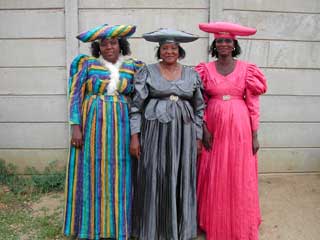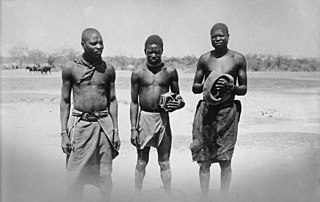Related Research Articles
Monotheism is the belief that God is the only deity, and that the world is a separate reality in which God intervenes, often through supernatural means. A distinction may be made between exclusive monotheism, in which the one God is a singular existence, and both inclusive and pluriform monotheism, in which multiple gods or godly forms are recognized, but each are postulated as extensions of the same God.
Zulu traditional religion consists of the beliefs and spiritual practices of the Zulu people of southern Africa. It contains numerous deities commonly associated with animals or general classes of natural phenomena. Unkulunkulu is known to be the Supreme Creator.

The Himba are an indigenous people with an estimated population of about 50,000 people living in northern Namibia, in the Kunene Region and on the other side of the Kunene River in southern Angola. There are also a few groups left of the OvaTwa, who the OvaHimba consider to be part of their tribe, but are hunter-gatherers. Culturally distinguishable from the Herero people, the OvaHimba are a semi-nomadic, pastoralist people and speak OtjiHimba, a variety of Herero, which belongs to the Bantu family within Niger–Congo. The OvaHimba are semi-nomadic as they have base homesteads where crops are cultivated, but may have to move within the year depending on rainfall and where there is access to water.

The Herero and Nama genocide was a campaign of ethnic extermination and collective punishment which was waged against the Herero (Ovaherero) and the Nama in German South West Africa by the German Empire. It was the first genocide to begin in the 20th century, occurring between 1904 and 1908.

The Herero are a Bantu ethnic group inhabiting parts of Southern Africa. There were an estimated 250,000 Herero people in Namibia in 2013. They speak Otjiherero, a Bantu language. Though the Herero primarily reside in Namibia, there are also significant populations in Botswana and Angola, and a small number in South Africa. The Hereros in Botswana and South Africa are there because of displacement during the 1904 - 1908 genocide committed by the German Empire.

The Ovambo people, also called Aawambo, Ambo, Aawambo, or Ovawambo (Kwanyama), are a Bantu ethnic group native to Southern Africa, primarily modern Namibia. They are the single largest ethnic group in Namibia, accounting for about half of the population. Despite concerted efforts from Christian missionaries to wipe out what were believed to be ‘pagan practices’, they have retained many aspects of their cultural practices. They are also found in the southern Angolan province of Cunene, where they are more commonly referred to as "Ambo". The Ovambo consist of a number of kindred Bantu ethnic tribes who inhabit what was formerly called Ovamboland. In Angola, they are a minority, accounting for about two percent of the total Angolan population.

Kaharingan is an indigenous monotheistic folk religion of the Dayak people such as Katingan, Lawangan, Ma'anyan, Ngaju, Ot Danum people native to the Central Kalimantan and South Kalimantan region in Indonesia.

Nama are an African ethnic group of South Africa, Namibia and Botswana. They traditionally speak the Nama language of the Khoe-Kwadi language family, although many Nama also speak Afrikaans. The Nama People are the largest group of the Khoikhoi people, most of whom have disappeared as a group, except for the Namas. Many of the Nama clans live in Central Namibia and the other smaller groups live in Namaqualand, which today straddles the Namibian border with South Africa.

The beliefs and practices of African people are highly diverse, including various ethnic religions. Generally, these traditions are oral rather than scriptural and are passed down from one generation to another through folk tales, songs, and festivals, and include beliefs in spirits and higher and lower gods, sometimes including a supreme being, as well as the veneration of the dead, and use of magic and traditional African medicine. Most religions can be described as animistic with various polytheistic and pantheistic aspects. The role of humanity is generally seen as one of harmonizing nature with the supernatural.

A nganga is a spiritual healer, diviner, and ritual specialist in traditional Kongo religion. These experts also exist across the African diaspora in countries where Kongo and Mbundu people were transported during the Atlantic slave trade, such as Brazil, the southern United States, Haiti and Cuba.

Religion in Ivory Coast is diverse, with no particular religion representing the majority of the population. According to the 2021 census, Islam is professed by 42.5% of the total population, while adherents of Christianity represented 39.8% of the population. In addition, 12.6% of Ivorians reported to be non-religious and 2.2% claimed to follow Animism.
Nyambe is the Supreme God, Sky Father, and God of the Sun across numerous traditional Bantu religions.

Akan religion comprises the traditional beliefs and religious practices of the Akan people of Ghana and eastern Ivory Coast. Akan religion is referred to as Akom. Although most Akan people have identified as Christians since the early 20th century, Akan religion remains practiced by some and is often syncretized with Christianity. The Akan have many subgroups, so the religion varies greatly by region and subgroup. Similar to other traditional religions of West and Central Africa such as West African Vodun, Yoruba religion, or Odinani, Akan cosmology consists of a senior god who generally does not interact with humans and many gods who assist humans.

Bantu religion is the system of beliefs and legends of the Bantu people of Africa. Although Bantu peoples account for several hundred different ethnic groups, there is a high degree of homogeneity in Bantu cultures and customs, just as in Bantu languages. Many Bantu cultures traditionally believed in a supreme god whose name is a variation of Nyambe/Nzambe.
The Zembapeople are a Bantu ethnic group residing in the border regions of Namibia and Angola. In Namibia, they are predominantly found in the Kunene region, most notably in the Opuwa area. They speak the Zemba language, also known as OtjiZemba or Dhimba. The Zemba are well-known for their distinctive hairstyles, intricate iron and copper jewelry, as well as traditional clothing that often incorporates animal hides. Additionally, they decorate themselves with a blend of ash, ochre paste, and rancid butter to enhance their appearance.
Jok is a term for a class of spirits in the traditional belief system of the Acholi people of Uganda and South Sudan. Jok are believed to be the cause of illness, misfortune, and death, as well as the source of power, protection, and prosperity. Traditional healers first identify the Jok in question and then make an appropriate sacrifice and ceremony to counter them. Alternatively if such an approach was unsuccessful the person possessed by the Jok could go through a series of rituals to gain some level of control over the Jok and then themselves become ajakwa. Jok can be ancestral or non-ancestral, and can be attached to specific clans, chiefdoms, natural phenomena, or historical events. Jok was believed to be the supreme god, who is the creator and ruler of the universe.

Vattisen Yaly is a contemporary revival of the ethnic religion of the Chuvash people, a Turkic ethnicity of Bulgar ancestry mostly settled in the republic of Chuvashia and surrounding federal subjects of Russia.

Mo or Moism is the religion of most Zhuang people, the largest ethnic minority of China. It has a large presence in Guangxi. While it has a supreme god, the creator Bu Luotuo (布洛陀), numerous other deities are venerated as well. It has a three-element-theory. Mo is animistic, teaching that spirits are present in everything.

Kongo religion encompasses the traditional beliefs of the Bakongo people. Due to the highly centralized position of the Kingdom of Kongo, its leaders were able to influence much of the traditional religious practices across the Congo Basin. As a result, many other ethnic groups and kingdoms in West-Central Africa, like the Chokwe and Mbundu, adopted elements of Bakongo spirituality.
Mukuru may refer to:
References
- ↑ MALAN, J. S. (1995). Peoples of Namibia. Los Angeles: Rhino Publishers. pp. 61–73.
- 1 2 3 Havelka, Ondřej (2022). "The Religion of the African Himba and Herero Ethnic Groups: the Supreme God Mukuru and his Violent Transformation into the Trinity". Dingir (in Czech). 25 (3): 86–88.
- ↑
- Crandall, David P. (2000). The Place of Stunted Ironwood Trees: A Year in the Lives of the Cattle Herding Himba of Namibia. New York: Continuum International Publishing Group Inc. pp. 47, 188. ISBN 0-8264-1270-X.
- 1 2 BOLLIG, Michael; BUBENZER, Olaf (2009). African Landscapes: Interdisciplinary Approaches. Berlin: Springer Science & Business Media. pp. 329–334.
- ↑ SARKIN-HUGHES, Jeremy (2011). Germany’s Genocide of the Herero: Kaiser Wilhelm II, His General, His Settlers, His Soldiers. Woodbridge: Boydell & Brewer. pp. 125–136.
